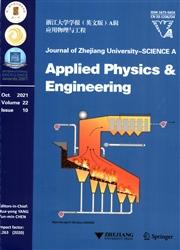Numerical investigation of the effect of geosynthetic clay liner chemical incompatibility on flow and contaminant transport through a defective composite liner
IF 3.9
3区 工程技术
Q1 ENGINEERING, MULTIDISCIPLINARY
引用次数: 0
Abstract
A composite liner consisting of a geomembrane (GMB) and a geosynthetic clay liner (GCL) can be compromised by inorganic contaminants because of a defective GMB. When the composite liner with defective GMB is exposed to aggressive leachate conditions, the neglect of the chemical incompatibility of the GCL can potentially result in an underestimation of the leakage rate and flux through the composite liner. This paper proposed a numerical investigation on the effect of chemical incompatibility of GCL on the barrier performance of the composite liner with hole defect. Four cases with leachate solutions having varied cation valencies and ionic strengths were analyzed, in which the hydraulic conductivity of GCL was concentration-dependent. Both the effect of the chemical incompatibility of GCL and the mechanisms were analyzed. The incompatibility of GCL resulted in significant increases in leakage rate and flux through the composite liner by factors of up to 4.9 and 5.0, respectively. The incompatibility-affected area in GCL is located within 0.1 m from the center of the hole in the GMB. The coupled increase in the hydraulic conductivity of GCL and pore water concentration impacts the flux and leakage in a short period of time. With GCL chemical incompatibility considered, advection may dominate the contaminant transport through GCL.土工合成粘土衬里化学不相容性对有缺陷复合衬里流动和污染物运移影响的数值研究
由土工膜(GMB)和土工合成粘土衬垫(GCL)组成的复合衬垫可能由于GMB的缺陷而受到无机污染物的损害。当含有缺陷GMB的复合衬垫暴露在侵略性渗滤液条件下时,忽略GCL的化学不相容性可能会导致对通过复合衬垫的泄漏率和通量的低估。本文对含孔洞缺陷复合材料衬垫的化学不相容性对其阻隔性能的影响进行了数值研究。分析了四种不同阳离子价和离子强度的渗滤液溶液,其中GCL的水力电导率是浓度依赖性的。分析了GCL的化学不相容性及其作用机理。GCL的不相容性导致复合衬垫泄漏率和通量显著增加,分别增加了4.9和5.0倍。GCL中的不兼容影响区域位于小巴孔中心0.1 m范围内。GCL的导水率和孔隙水浓度的耦合增加影响了短时间内的通量和泄漏量。考虑到GCL的化学不相容性,平流可能主导污染物通过GCL的输送。
本文章由计算机程序翻译,如有差异,请以英文原文为准。
求助全文
约1分钟内获得全文
求助全文
来源期刊

Journal of Zhejiang University-SCIENCE A
工程技术-工程:综合
CiteScore
5.60
自引率
12.50%
发文量
2964
审稿时长
2.9 months
期刊介绍:
Journal of Zhejiang University SCIENCE A covers research in Applied Physics, Mechanical and Civil Engineering, Environmental Science and Energy, Materials Science and Chemical Engineering, etc.
 求助内容:
求助内容: 应助结果提醒方式:
应助结果提醒方式:


